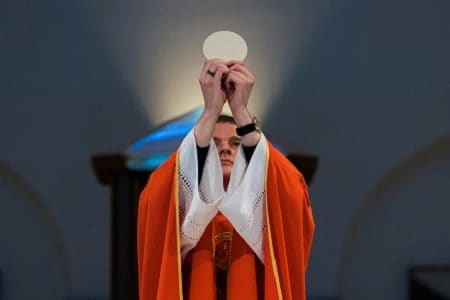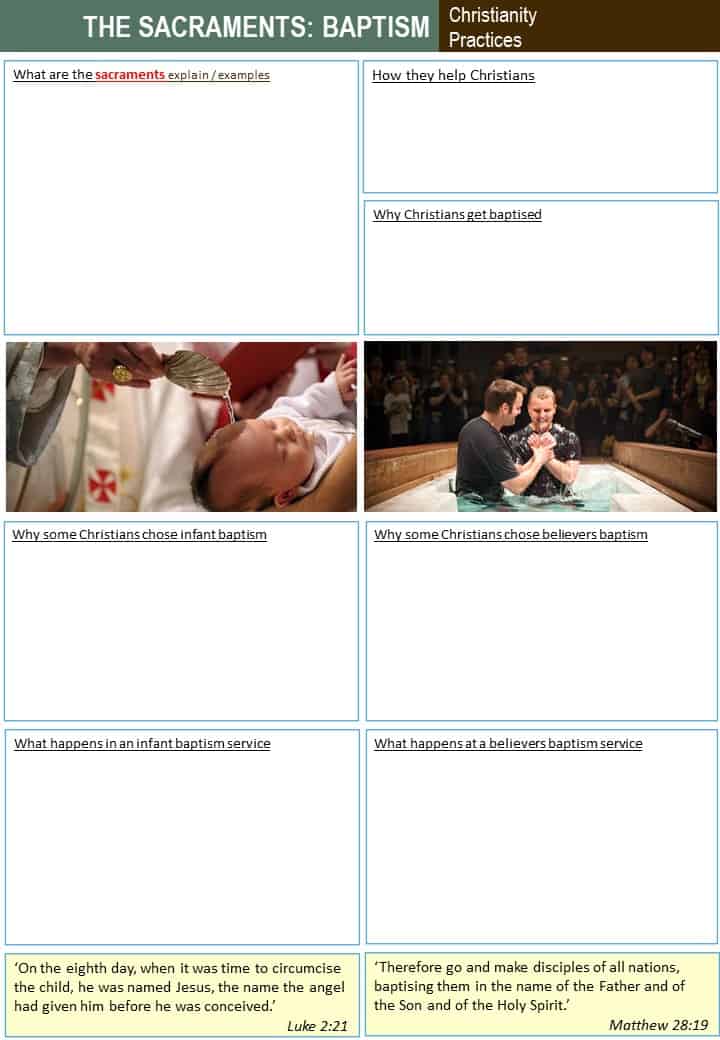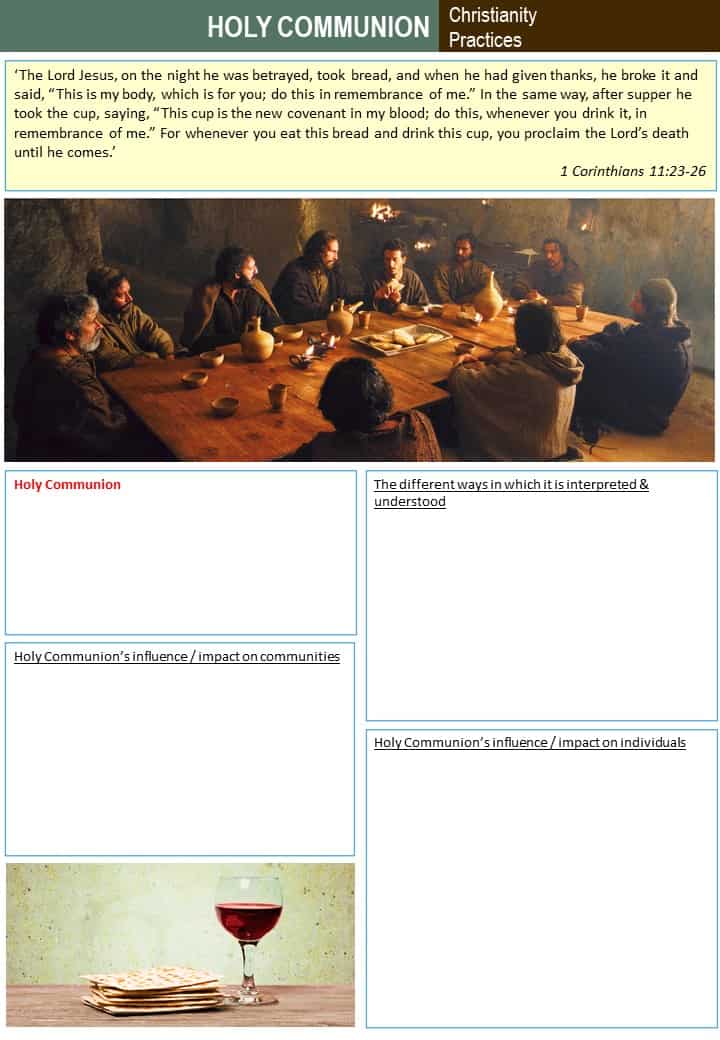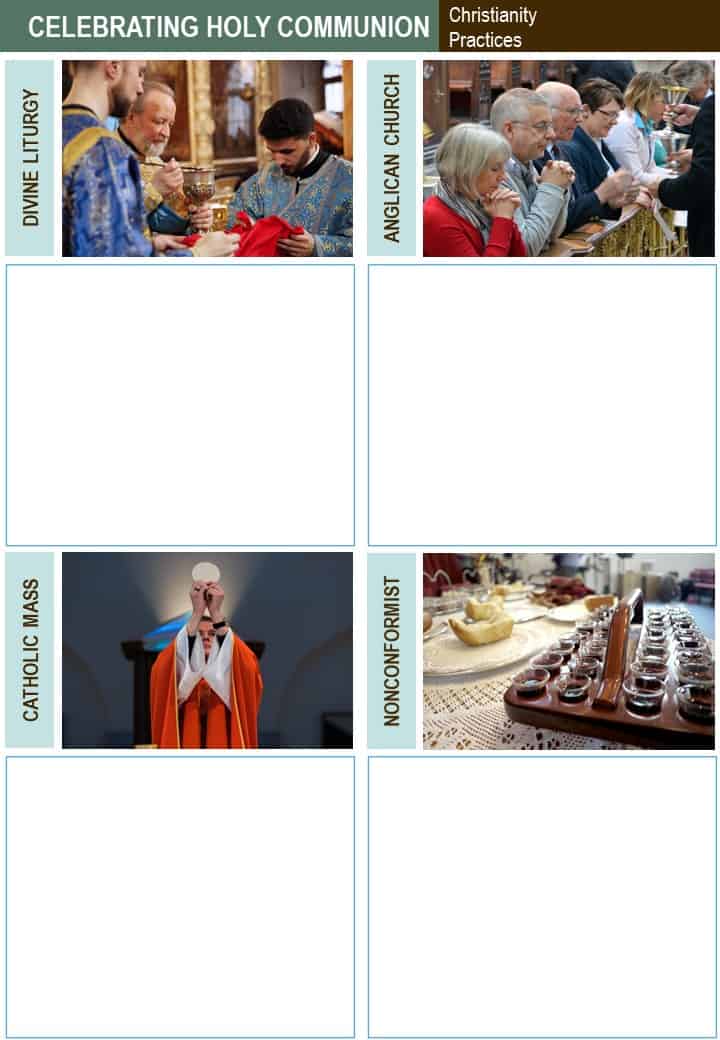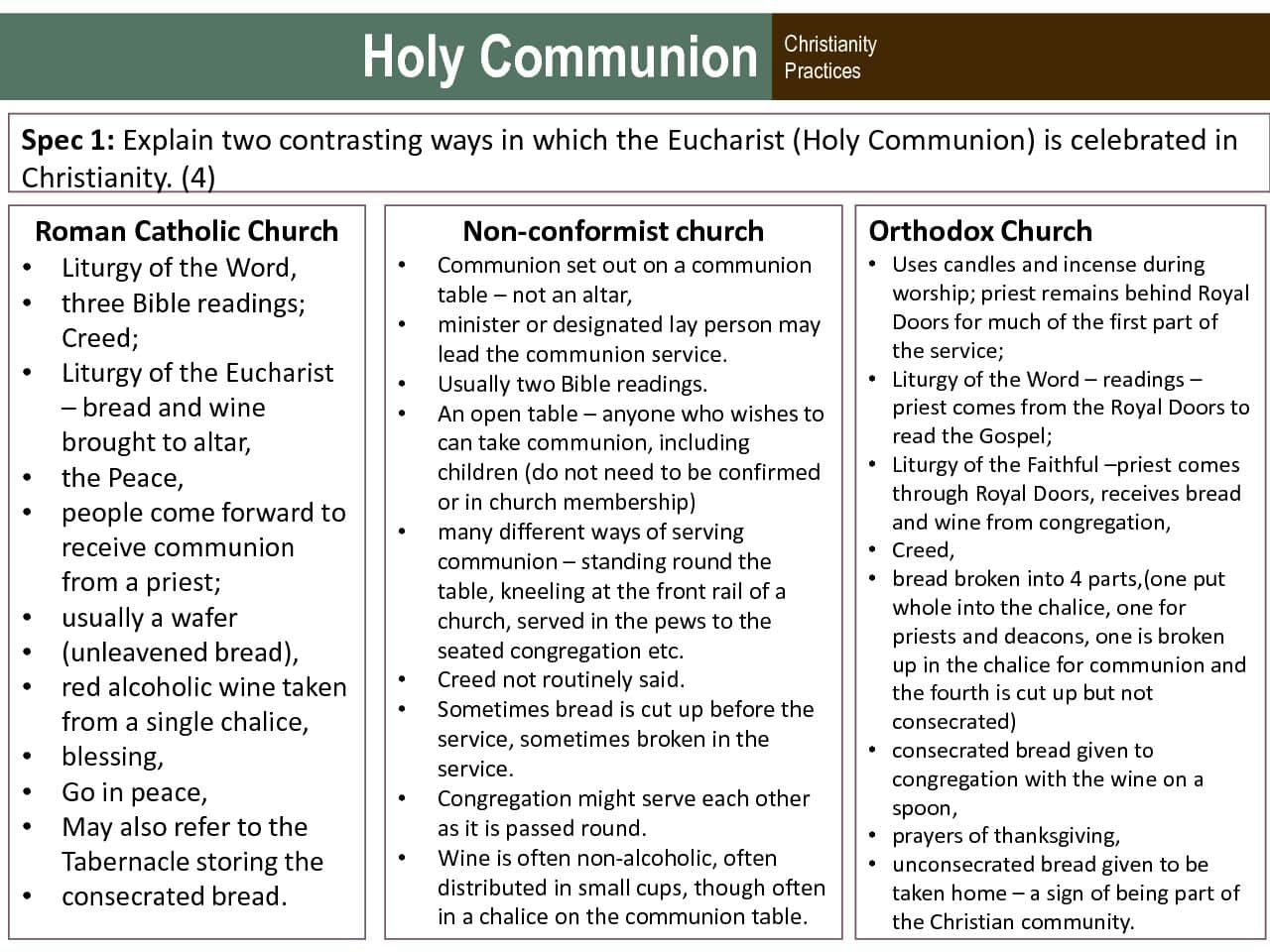Christian practices
The role and meaning of the sacraments:
The meaning of sacrament
The sacrament of baptism and its significance for Christians; infant and believers’ baptism; different beliefs about infant baptism
The sacrament of Holy Communion/Eucharist and its significance for Christians, including different ways in which it is celebrated and different interpretations of its meaning.
Baptism
‘Infant baptism is not as important as believers’ baptism.’ (12)
2018
Arguments in support
- Baptism is meant to wash away a person’s sins / Infants are too young to have sins / so the ritual of infant baptism is less important than the informed consent of believers’ baptism.
- Baptism should be a personal decision to become a member of the Christian Church / Infants are not capable of taking personal decisions / which lessens its importance by comparison with a believer’s decision to be baptised.
- Jesus was an adult when baptised / so Christians have no obvious obligation to be baptised as infants, etc.
Arguments in support of other views
- Everyone descends from Adam / and so everyone inherits Adam’s sin through seminal identity / so this sin needs to be removed as soon as possible by the actions of the Church in baptising infants / Infant baptism is therefore necessary to do this.
- Everyone has a tendency to sin / so everyone needs salvation / including infants / Baptism then brings the infant into the Church as early as possible / so the child has the support of the entire Christian community.
- The gifts of the Holy Spirit / allow an infant to grow up in God’s love, etc.
‘Only adults should be baptised into the Christian religion.’ (12)
2022
Arguments in support
• Most adults are able to make reasoned choices, whereas most children are not / so cannot make reasoned choices about baptism.
• The question supports believers’ baptism and rejects infant baptism / given the importance of baptism as a Christian ceremony, adults should choose for themselves rather than let their parents or somebody else choose for them.
• Some might argue that what saves a Christian is not being baptised but living as Jesus commanded / that can be achieved only by understanding what Jesus taught / which cannot be done as an infant.
• The baptism of believers is more powerful than that of infants / because the ceremony underlines the importance of what the adult individual is choosing / which is to be fully acknowledged as a child of God / and to receive God’s saving grace.
• Believers’ baptism usually involves total immersion in water to symbolise the washing away of sins / which is hardly a suitable ritual for an infant / so it is best to avoid infant baptism and let children wait until they can decide for themselves.
• A ceremony with the importance of baptism will be more meaningful to the individual Christian if it is understood / only the mature individual can decide when it is understood fully.
• Without sincerity of belief in baptism, the ceremony has little meaning / sincerity can be judged by the individual’s testimony during the service of baptism.
• Jesus himself was baptised as an adult / which is a clear indication that baptism should be chosen by adults, etc.
Arguments in support of other views
• The fact that Jesus chose baptism as an adult does not mean that everybody should be baptised only when they are adults / Jesus did not specify when you should be baptised / infant baptism is not referred to specifically in the New Testament / but some biblical references imply that it happened (eg Acts 2:38-39).
• For many Christians, baptism is a sacrament: an outward sign of an inward grace / so there is no reason why God’s grace should not be given to those who are too young or who are otherwise unable to choose baptism for themselves.
• Symbolic actions are important in Christianity / eg the bread and wine symbolising Jesus’ body and blood / and baptism symbolises clearly that a child is part of the Christian Church, the body of Christ.
• God’s grace can be given by baptism at any age / so some argue that this should be at as young an age as possible / at baptism, the infant receives God’s grace as a member of the Church / and the infant is then believed to be freed from sin / and is introduced to the support of the Christian community.
• This means that an infant’s inability to choose baptism is not important / since baptism can be chosen for the infant by its parents or guardians.
• Some believe that by being baptised as an infant, a child is cleansed of the ‘original sin’ of Adam and Eve / and can go to heaven after death / so again, this can be seen as a reasonable choice made by parents and guardians for an infant.
• Some Christians do not accept baptism / some denominations do not have baptism / so in their view no one should be baptised into the Christian religion, etc.
Holy Communion
Explain two contrasting ways in which the Eucharist (Holy Communion) is celebrated in Christianity. (4)
Spec 1
Non-conformist church
Communion set out on a communion table – not an altar, minister or designated lay person may lead the communion service. Usually two Bible readings. An open table – anyone who wishes to can take communion, including children (do not need to be confirmed or in church membership) many different ways of serving communion –
standing round the table, kneeling at the front rail of a church, served in the pews to the seated congregation etc. Creed not routinely said. Sometimes bread is cut up before the service, sometimes broken in the service. Congregation might serve each other as it is passed round. Wine is often non-alcoholic, often distributed in small cups, though often a chalice on the communion table.
Orthodox Church
Uses candles and incense during worship; priest remains behind Royal Doors for much of the first part of the service; Liturgy of the Word – readings – priest comes from the Royal Doors to read the Gospel; Liturgy of the Faithful –priest comes through Royal Doors, receives bread and wine from congregation, Creed, bread broken into four parts,(one put whole into the chalice, one for priests and deacons, one is broken up in the chalice for communion and the fourth is cut up but not consecrated) consecrated bread given to congregation with the wine on a spoon, prayers of thanksgiving, unconsecrated bread given to be taken home – a sign of being part of the Christian community.
Roman Catholic Church
Liturgy of the Word, three Bible readings; Creed; Liturgy of the Eucharist – bread and wine brought to altar, the Peace, people come forward to receive communion from a priest; usually a wafer (unleavened bread),red alcoholic wine taken from a single chalice, blessing, Go in peace, May also refer to the Tabernacle storing the
consecrated bread.
Explain two reasons why celebrating Holy Communion/Eucharist is important for many Christians. (5)
2019
• Holy Communion/Eucharist is important for Christians because of Jesus’ Last Supper with his disciples / where Christians believe that what Jesus said and did were important for all Christians.
• For some Christian denominations Holy Communion/Eucharist is a sacrament – a ceremony which gives spiritual grace.
• In Luke’s account (Luke 22) the Last Supper is a meal to celebrate Passover / Jesus transformed the celebration into something connected with his suffering, death and resurrection.
• Jesus identified the bread as his body and the wine as his blood (eg Mark 14:22–25) / these symbolise Jesus’ sacrifice/atonement for human sin.
• For Roman Catholics, the importance of the Mass is seen in the belief in transubstantiation / that the bread and wine become the actual body and blood of Jesus.
• For some Protestants, the bread and wine are symbols of Jesus’ death, which brought salvation to humanity.
• For others, the service unites the worshipper with Christ / it is ‘soul food’.
• The celebration brings Christians together / unites members of a church.
• In Paul’s account of the Last Supper (1 Corinthians 11:17–34), Jesus’ actions with the bread and wine are accompanied by Jesus saying, ‘Do this in remembrance of me’ / so some see this as an important command to repeat Jesus’ actions, etc.
Note: Do not credit comments on why Holy Communion/Eucharist is not important to some Christians.
‘The celebration of Holy Communion (Eucharist) is the most important part of Christian life.’ (12)
2021
Arguments in support
• Holy Communion/Eucharist is a sacrament, a holy ritual, and is (alongside baptism) one of two
sacraments authorised by Jesus.
• Jesus was explicit about the celebration of Holy Communion/Eucharist / ‘The Lord Jesus on the night he was betrayed took bread, and when he had given thanks he broke it, and said, “This is my body which is for you. Do this in remembrance of me.” In the same way also the cup, after supper, saying, “This cup is the new covenant in my blood. Do this, as often as you drink it, in remembrance of me.” For as often as you eat this bread and drink this cup, you proclaim the Lord’s death until he comes.’ (1 Corinthians 11:23-26) / Christians are therefore obliged to carry out this command until Jesus comes again, which underlines its importance.
• The authority of the command comes from the situation, which was Jesus’ last supper with his disciples before his arrest and crucifixion.
• For worshippers, re-enacting the Last Supper makes it real and authoritative for believers.
• Holy Communion/Eucharist is an act of fellowship between Christians everywhere / so Christians throughout the world worship in solidarity, whatever situation they are in / churches make everyone welcome to that fellowship, regardless of age, gender or race, etc.
Arguments in support of other views
• Others will argue that celebrating Holy Communion/Eucharist is only one part of Christian life, and is not the most important in comparison with faith, good works, prayer, etc.
• Some prefer a less rigid understanding of Holy Communion/Eucharist / and this leads to different ways of celebrating it / for example Roman Catholics believe that the bread and wine become the actual body and blood of Christ through transubstantiation / whereas Protestants do not, often regarding it simply as a fellowship meal / the differences suggest that Holy Communion/Eucharist is not the main focus of Christian belief and action for all.
• At the start of Jesus’ ministry he told the people to ‘Repent, for the kingdom of heaven is at hand’ (Matthew 4:17) / Matthew 4:23 goes on to say that – ‘he went about all Galilee, teaching in their synagogues and preaching the gospel of the kingdom and healing every disease and every infirmity among the people’ / some therefore argue that the essence of Christian living is not to follow rituals such as Holy Communion / Eucharist but to follow the example of Jesus by preaching, teaching and healing.
• Methodists, for example, see Jesus’ commands about Holy Communion/Eucharist as a memorial: the bread and wine are symbols of Jesus’ death, and Jesus’ death brought salvation / many churches focus on what they should do to bring salvation to all, focusing eg on baptism to remove people’s sins.
• Some Christians do not celebrate Holy Communion/Eucharist / eg Salvation Army; also Quakers, who question why some practices should be seen as sacred and not others / some may argue that during Lockdown, Holy Communion/Eucharist was impossible, and yet Christians survived without it.
• Others focus on faith rather than ritual as the guide for all Christian life / following Jesus’ example
of healing through the faith of the person concerned / eg in the healing of Jairus’ daughter / ‘Daughter, your faith has made you well.’ (Mark 5:34).
• Others focus on doing good works, guided by the conduct and the teachings of Jesus / particularly in the Sermon on the Mount (Matthew 5:1-7:27) / since ‘faith by itself, if it has no works, is dead’ (James 2:17), etc.
Resources
Videos









